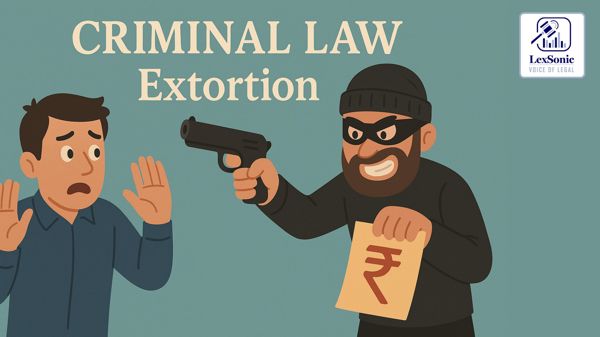In a significant ruling of M/s. Balaji Traders v/s The State of U.P. & Another., the Supreme Court of India has overturned a High Court order that quashed a summoning order and criminal proceedings in an extortion case. The apex court's decision clarifies the crucial distinction between Section 383 (extortion) and Section 387 (putting person in fear of death or grievous hurt in order to commit extortion) of the Indian Penal Code, 1860 (IPC).
The case, which reached the Supreme Court as an appeal from a judgment of the High Court of Judicature at Allahabad, stemmed from a complaint filed by Prof. Manoj Kumar Agrawal, proprietor of M/s. Balaji Traders, a betel nut leaves business. He alleged that Sanjay Gupta, who had started a similar business, along with three unknown individuals carrying rifles, stopped and threatened him to close his business or pay Rs. 5 lakhs per month. Upon his refusal, the complainant was allegedly beaten and an attempt was made to kidnap him.
After the police failed to register an FIR, Prof. Agrawal filed a complaint under Section 200 of the Code of Criminal Procedure, 1973 (CrPC). The Trial Court, after reviewing the evidence, found a prima facie case against Sanjay Gupta and issued summons under Section 387 IPC.
However, the High Court, in a Criminal Miscellaneous Application filed by the accused, quashed the summoning order and the entire proceedings. The High Court's reasoning was that an essential ingredient of extortion under Section 383 IPC – the delivery of property or valuable security – was missing, and therefore, no offence under Section 387 IPC could be made out.
Supreme Court's Analysis and Ruling:
The Supreme Court meticulously analyzed the relevant sections of the IPC concerning extortion:
Section 383 (Extortion): Defines the act of intentionally putting someone in fear of injury and thereby dishonestly inducing them to deliver property or valuable security.
Section 384 (Punishment for Extortion): Prescribes punishment for committing extortion.
Sections 385, 387, and 389: These sections deal with acts committed in order to commit extortion, even if the act of extortion itself is not completed and no property is delivered.
Section 386 (Extortion by putting a person in fear of death or grievous hurt) and Section 388: These are aggravated forms of extortion, where the actual commission of the act occurs.
The Supreme Court highlighted a clear distinction: Sections 386 and 388 deal with the actual commission of extortion, while Sections 385, 387, and 389 punish for actions undertaken for the purpose of committing extortion.
The Court emphasized that Section 387 IPC, which is an aggravated form of Section 385 IPC, penalizes the act of "putting a person in fear of death or grievous hurt, in order to commit extortion." Crucially, the bench stated that for an offense under Section 387 IPC, the delivery of property is not necessary. It is the process of putting a person in fear for the purpose of committing extortion that is criminalized.
Referring to previous judgments, including Radha Ballabh v. State of U.P. and Gursharan Singh v. State of Punjab, the Supreme Court reiterated that convictions under Section 387 IPC were upheld even when no ransom or money was actually paid. The Court also cited Somasundaram v. State, where conviction under Section 387 IPC was upheld despite no delivery of property, as the victim was threatened with death or grievous hurt to part with money or execute documents.
Strict Interpretation of Penal Statutes:
The Supreme Court reiterated the well-settled principle of law that penal statutes must be strictly interpreted, and courts should not read anything into a statutory provision that imposes penal liability. The Court found the High Court's reasoning "flawed and misplaced" for assigning the essential ingredient of Section 383 (delivery of property) to Section 387 IPC.
Quashing of FIRs and Complaints:
The judgment also touched upon the principles governing the High Court's inherent jurisdiction under Section 482 CrPC to quash criminal cases. Citing precedents like State of Haryana v. Bhajan Lal and Neeharika Infrastructure (P) Ltd. v. State of Maharashtra, the Court underlined that the power of quashing should be exercised sparingly, with circumspection, and only in the "rarest of rare cases." The High Court's role is to consider whether the allegations in the FIR disclose a cognizable offense, not to delve into the merits of the allegations.
Conclusion:
Based on its analysis, the Supreme Court concluded that the instant case was not fit for quashing. The complaint prima facie disclosed the two essential ingredients for prosecution under Section 387 IPC: (a) the complainant was put in fear of death by pointing a gun, and (b) this was done to pressurize him to deliver Rs. 5 lakhs. The Court explicitly stated that whether the money was delivered or not is immaterial for a charge under Section 387 IPC.
Consequently, the Supreme Court allowed the appeal, set aside the High Court's order dated June 28, 2024, and restored the proceedings of Complaint Case No. 58 of 2022 to the Trial Court. The parties have been directed to appear before the Trial Court on August 12, 2025, and cooperate for an expedited hearing.
This ruling provides much-needed clarity on the scope of Section 387 IPC, reinforcing that the act of putting a person in fear of death or grievous hurt with the intention to commit extortion is a distinct and punishable offense, irrespective of whether the extortion is successfully completed.
Section 385., Indian Penal Code - 1860
Section 387., Indian Penal Code - 1860
Section 389., Indian Penal Code - 1860
Indian Penal Code, 1860
Section 482., Code of Criminal Procedure - 1973
Code of Criminal Procedure, 1973

